Also known as English Pointer, Pointer belongs to the work line and is famous for its strong will and incredible pent-up energy. Although, this dog breed was originally bred to serve in working fields and dog shows, English Pointers are generally friendly dogs which makes them an excellent option as a family pet.
They are calm and gentle around kids & other animals and fun around adults. Especially, if you are a running enthusiast, Pointer will love to accompany you on your long daily walks and jogs.
And yes, they are also great as cuddle machines as they will be more than happy to cuddle with you, for as long as they don’t find any distraction or activity.
They are smart, they are clever, and on top of everything, they are extremely loyal to their owners. If required, they can throw themselves in front of danger, just to protect their owners – quite impressive, isn’t it?
However, despite having such a remarkable set of traits, these dogs can’t be considered easy pets to own or train. But if you still want to own one, you better go through the given information first.
Let’s begin!
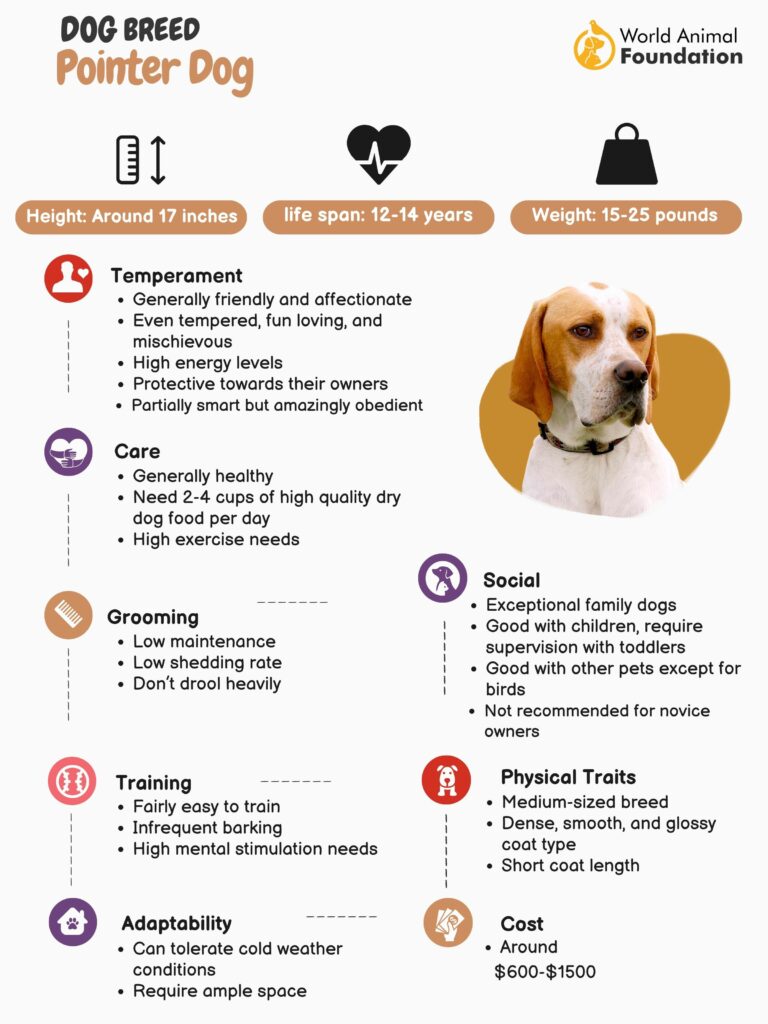
About the Breed
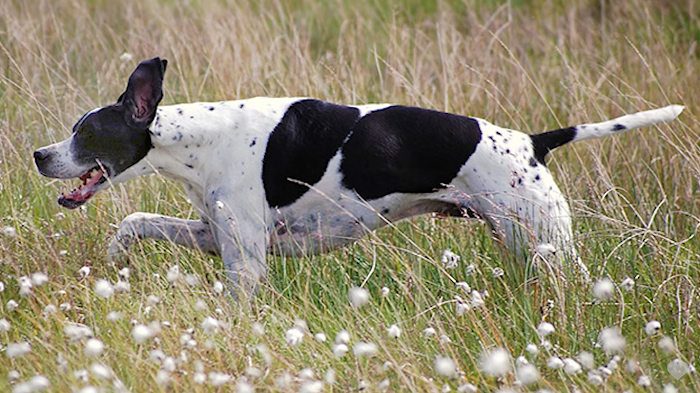
As the name implies, the Pointer dog breed comprises working canines that point game and accompany the owners in hunting. Wondering why hunters need a dog to point game? Well, because these dogs can point even small animals and birds, from the wildest bushes, which men can’t find.
Since they are neither too large nor too small, these medium-sized dogs can pass through thick dunes and dense brush quite efficiently. And that’s the very reason why hunters have been using Pointers as their companion dogs for centuries.
Since these dogs were used to point the shooting birds, they are also sometimes referred to as bird dogs.
However, besides Spanish Pointers and English Pointers, that were only developed and used to point game birds, some other types of Pointers also retrieve the game. This includes the German Shorthaired Pointer which features webbed feet so they could swim and retrieve waterfowl.
However, such retrieving Pointers are generally larger than their English and Spanish cousins. The good thing is that both these types of Pointer dog breeds are great for families with other dogs and children. However, its huge hunting instinct may make this dog trouble for your pet birds.
In addition to English and German Pointers, various other popular breeds also fall under the category of Pointer dogs, such as the large French Pointer, Weimaraner, Small Munsterlander, Wirehaired pointing Griffon, Auvergne Pointer, old Danish Pointer, and setter breeds (mainly the English Setter).
Whatever type of pointing dog you own, remember that these dogs possess a surplus amount of energy, and to vent it out, they need plenty of exercise. Considering their exercise needs, this same breed can’t be recommended for apartment dwellers and first-time dog owners.
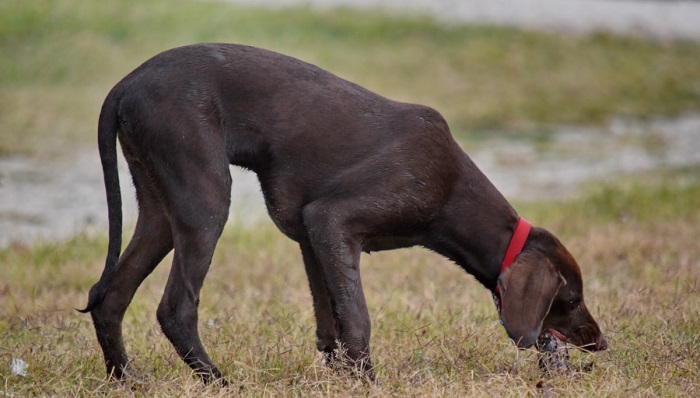
They are strong and brave; thus, they need owners with the same level of strength and bravery. Likewise, to suppress their bird-hunting instincts and make Pointers generally calm towards other pets, they need to be involved in obedience training from a very young age.
Before you bring a Pointer home, make sure you arrange an all-time activity for it. Otherwise, a bored Pointer might develop unwanted behaviors, which will be super hard to correct.
These dogs enjoy country-style living conditions since there they could roam and run around freely, with no boundaries.
History of the Pointer Dog
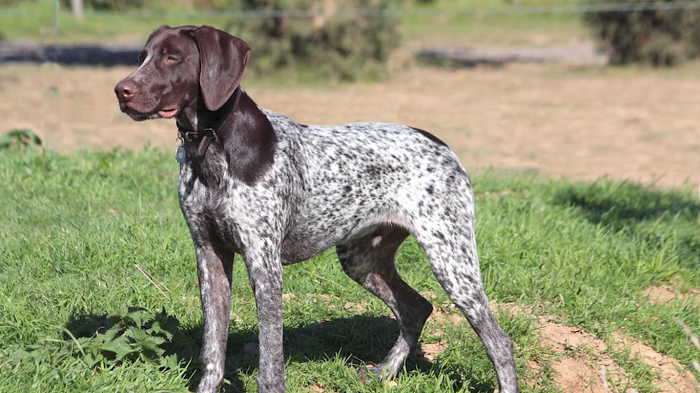
As stated before, many breeds are enlisted in the category of Pointer dogs, English Pointers are most commonly called Pointers since they were the very first to originate and register. The history of these dogs is not quite clear. Many believe that these dogs have been existing in England since the 1650s.
However, some others believed that these dogs originated from the Spanish Pointers that were brought to England in 1713. This assumption is considered more correct since Pointers appeared in British history, for the very first time, in 1725, through the painting in which they are shown with the 2nd duke of Kingston.
These Spanish Pointer dogs were then improvised by the English breeders as they crossbred them with bloodhounds, foxhounds, greyhounds, and other hunting dogs. Some people said that Pointers share lineage even with the Bulldogs but we’re not so sure about it.
Breeders wanted to make a new breed that would include the endurance and sturdiness of foxhounds, the speed of greyhounds, and scenting abilities of bloodhounds.
However, even after making a canine with all these golden traits, breeders didn’t settle down and they bred the dog with Setter dogs to inherit their cool and friendly temperaments.
Resultantly, the breeders were able to develop their ideal hunting dog, after decades of struggle. This dog features a long, slender, and muscular body, which was first used to hunt hares.
However, in the early eighteenth century, these dogs also began to be used as bird dogs and gun dogs.
Around 1860, Pointers were brought to America by bird hunters, where these dogs were hugely praised during field trials. Even a special Westminster kennel club was formed in 1877 that used to work primarily for the improvement and preservation of Pointers.
To carry on the preservation and protection of this dog breed on a larger scale, the American Pointer Club was founded in 1938.
However, these dogs were recognized by the American Kennel Club in 1878 as sporting dogs. Also, it’s one of the first eight dog breeds registered in the National Breed Club of America (AKC).
Until now, Pointers have participated in various dog sports tournaments and won numerous titles. They are still one of the favorite canine choices of hunters and dog show organizers.
Pointer Dog Facts
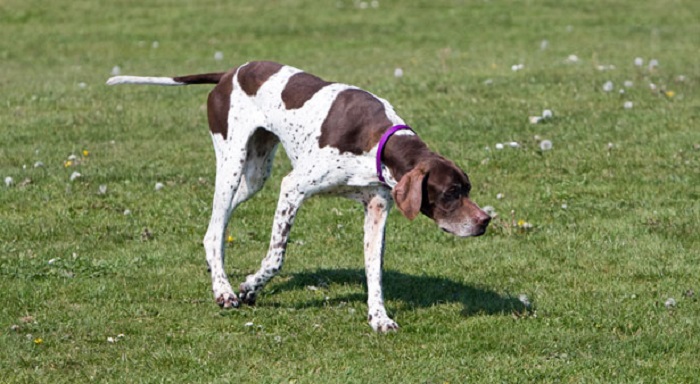
- The average life expectancy of pointer dogs is 12-17 years.
- Pointers don’t bark a lot so by owning one, you won’t have to face problems like excessive barking.
- Pointer puppies, especially the English pointer puppy, may have high tendencies to chew, nip, and play-bite. Although these bites are not too strong, these dogs still should train properly to suppress this biting behavior.
- It’s believed that female pointers are less affectionate and more independent-minded than male pointers. So, if you want a more compassionate and agile pointer dog, you better go with male pointers.
- Compared to other dogs, pointers sleep only for six to eight hours, during their puppyhood. However, an adult dog might sleep for 10-12 hours a day.
- Many pointers tend to sleep on their backs to vent out excessive heat through their paws. This, in turn, helps them to cool down in summer.
- Pointers, especially the german pointers, tend to snore loudly. Some pointers are even reported to emit loud whimpering sounds while sleeping.
- Pointer dogs can do well during cold weather. Even the German shorthaired pointers carry water and weather-resistant coat that protect them from rain and cold.
- In a single litter, a german pointer may deliver about eight to ten puppies.
- Pointer dogs can be kept outside the house, in a securely fenced yard, only if the temperature over there is above 45 degrees Fahrenheit. If the temperature drops below this point, you better take your dog inside or arrange a kennel for him to keep him warm.
Pointer Dog Appearance
English Pointers feature sloped and long necks & shoulders with medium-sized heads, long muzzles, and high-set, floppy ears. Their feet are arched and their toes are well-padded whereas their wide chests impart an overall athletic look.
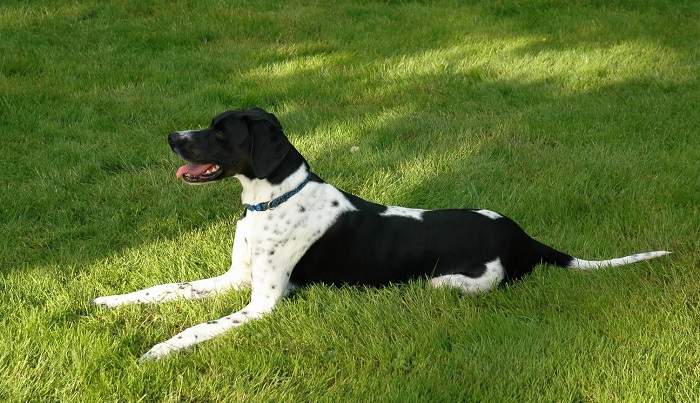
On the other hand, German Pointers also come with nearly the same features with one exception; their feet are webbed.
Size
Female Pointers are relatively shorter than male Pointers, as they could be 21-24 inches tall. On the other hand, the male Pointer may grow a height of about 22-24 inches. Considering this size range, these high-energy dogs can be categorized as medium-sized dogs.
Weight
The healthy weight range of a Pointer depends upon the dog’s age, size, and sex. For example, a healthy female Pointer should weigh around 44-66 lbs, whereas a male Pointer, when healthy, should weigh around 55-75 lbs.
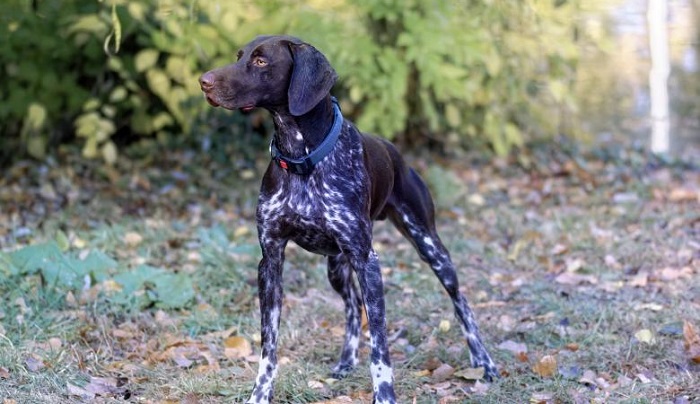
Coat
Engish Pointer features a short, dense, and smooth coat that appears quite glossy from a distance.
Both the English and German Pointers have single coats, whereas the German Wirehaired Pointer features weather and waterproof double coats. The good part is that the English and German Pointers are not heavy shedders.
Color
You’ll get to find a wide range of coat colors in English Pointer dogs including solid black, liver, black & white, orange & white, liver & white, and lemon & white Pointer.
Some Pointers also feature tricolored coats but such dogs are super rare. Besides, some Pointers come with ticking/spackles on the white patches of their coats.
Pointer Dog Temperament and Personality
At first glance, these dogs might look super serious, graceful, or what we call, aristocratic, but at home, these canines can be hyperactive and quite mischievous.
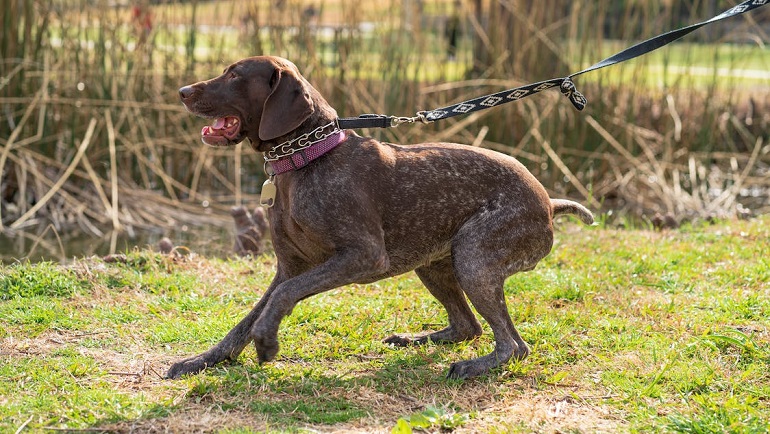
Pointers love to spend time with their family members (including the human and animal family), joining them in their daily life activities, playing gently with young kids, and waiting for the elderly members patiently so they could settle down and hold them up for cuddles.
These dogs have a great urge to please their owners and gather appreciation from everyone around.
However, we can’t deny the high prey drives these dogs have. Although they go well with cats and other dogs, they might chase squirrels, birds, and other small animals playing in your backyard. Thus, to suppress this incompatibility, it’s advised to raise your puppy with other pets.
Although these dogs don’t bark too much they could still alert you about a visitor, proving themselves excellent watchdogs. Pointers are not aggressive towards strangers.
For some time, they might be a little reserved but after this, they might grow friendly. However, that’s only possible if you start socializing your Pointer pup from an early age.
Overall, Pointers are even-tempered and mild-mannered around their loved ones, when physically and mentally fit. However, you should stay prepared to face undesirable behaviors and endless tantrums when leaving this canine alone for only a few hours.
Before you own this dog, you should keep in mind that you are going to own one of the clingiest dogs ever.
Whether you are outside, exploring the woods, or in in your home, this dog doesn’t consider himself an intruder, regardless of whatever the situation is.
Generally, these dogs tend to maintain a light and bright aura around them, their energy-rich bodies might make them hard to control sometimes.
For such situations, you should make them participate in obedience trials so they could learn and remember the basic commands. Lastly, a dog’s temperament depends greatly on the temperament of its parents so it’s important to meet with your Pointer puppy’s parents once, before owning him.
Pointer Dog Health and Care
Pointers are generally healthy dogs but still, they might catch some genetic health problems, such as follows:
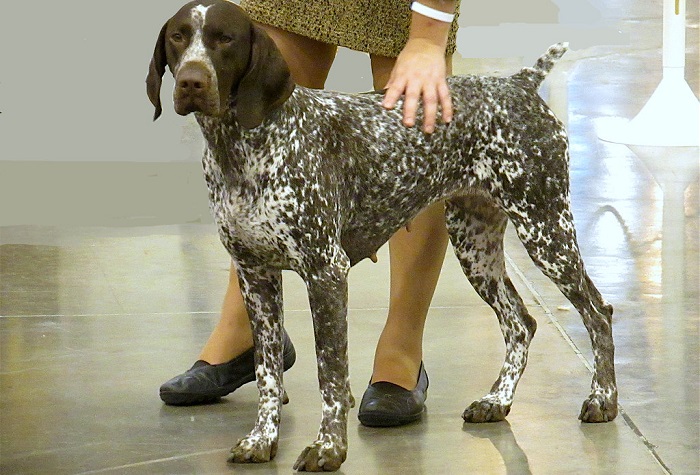
Hip Dysplasia
Hip dysplasia is a hereditary disease in which a dog’s pelvis region gets affected. The hip joint and thigh muscles get partially detached from the pelvic socket, affecting your dog’s mobility.
This disorder can be cured completely with surgery but if diagnosed at an early stage, it can also be treated by physiotherapy sessions.
Progressive Retinal Atrophy
It’s one of the most common health conditions which affects your dog’s vision. In this, your dog’s retina begins to deteriorate gradually. In the earlier stage of this disease, a dog only develops night blindness; however, as the condition worsens, he grows blind completely.
Besides these major health issues, a Pointer is also prone to developing various other conditions, too, including epilepsy, cherry eye, neurotropic osteopathy, entropion, Addison’s disease, and skin allergies.
The only way to prevent hereditary diseases is to purchase a dog from reputable breeders and go through all the health clearances before locking the deal. On the other hand, to prevent non-congenital diseases, pay special attention to your dog’s diet, grooming, hygiene, and exercise needs.
Since Pointers are low-shedding dogs, their grooming requirement is quite low. All you need to do is to brush their coats once or twice a week. Since a Pointer’s short coat might be hard to comb by brush, you better get hound mitt gloves to reach all the parts of his body.
Stick to the diet formulated especially for high-energy dogs and discuss the portion size with your vet thoroughly. To keep them physically and mentally fit, take them for daily strolls and play with them for at least an hour every day.
Similarly, when inside the house, indulge them in mind games so they could get enough mental stimulation.
Pointer Dog Training
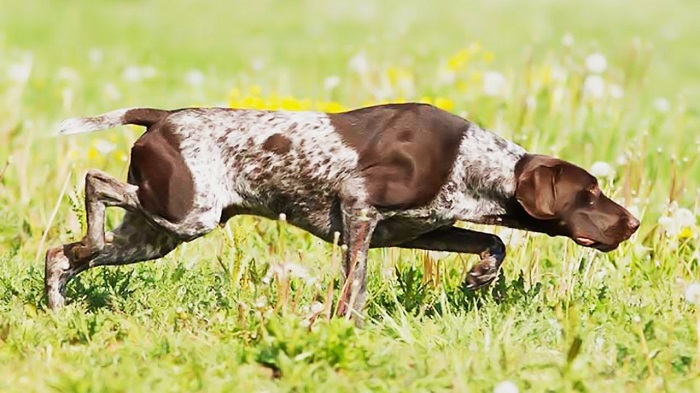
Do you know that Pointers are one of those few breeds that are super easy to leash train? Despite having independent minds, these dogs possess huge brains with which they can understand simple commands quickly.
However, during its initial few years, between 6 months to one year, Pointers can be super difficult to handle due to their excitability, high energy drive, and insane need for exercise.
Even at such a young age, this dog can comprehend, learn, and develop behaviors, so don’t wait for a Pointer pup to get mature and start his training from a young age.
To train your Pointer to stay calm around birds, you better start familiarizing them with the bird, from puppyhood (when he is eight years old). We are not saying to arrange a one-on-one interaction of a Pointer with a pigeon but still, you can at least get a feather or wing with the scent of the bird on it.
Since Pointers are quite hyperactive, they can get distracted super quickly, which might disrupt the training. Sadly, you can’t do anything about this other than working on your patience. Stay consistent with the training and offer them their favorite treats to regain their attention.
Lastly, always stick to the positive reinforcement training methods and remember that these dogs are super sensitive towards harsh tones and cruel training tactics. Don’t expect a Pointer to obey you out of fear since the only way to make them your ideal canine companion is through love and patience.
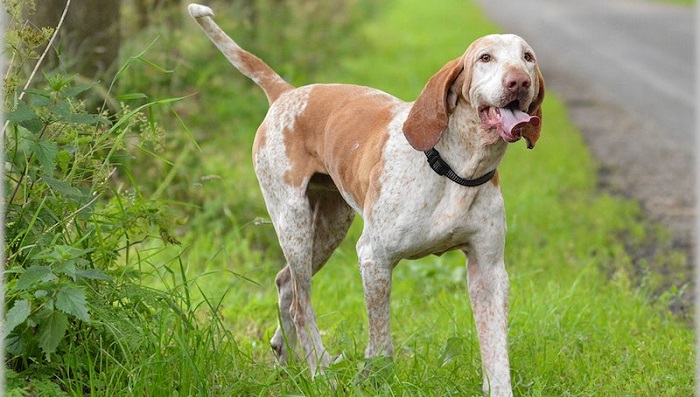
Conclusion
Generally, a Pointer costs between $600-&1500, however, you can get one for free from Pointer rescue groups. The good thing here is that these dogs are not too expensive to own.
If you add all of their essential needs, including treats, toys, treats, and regular checkups, a Pointer will cost you about $100-$200/month.












